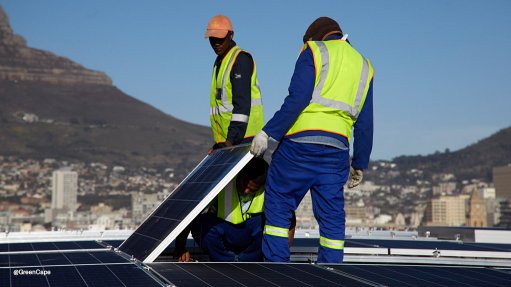Intra-African trade and investment to drive long-term development


PROMOTING ECONOMIC GROWTH African countries need to become more self-sufficient, relying on a network of neighbouring countries and regional trade blocks to support their growth
While the current reality is that many African countries have become reliant on foreign direct investment (FDI) to implement their development plans, the longer-term goal should be for these countries to become self-sufficient, says Thomson Reuters Africa corporates and partnerships head Kamal Patel.
In becoming self-sufficient, such countries should rely on a network of neighbouring countries and regional trade blocks to support their growth, he adds.
Seven of the world’s ten fastest-growing economies are located in Africa, with several countries on the continent making solid progress to reform policies and institute strong governance that is influenced by international best practices, he highlights.
As a direct result of this, there has been burgeoning investment in key sectors, including power, resources, agriculture, information and communication technology and infrastruc- ture. With an emerging middle class in Africa, fast-moving consumer goods and retail industries have also grown exponentially.
However, the global economic slump of the past few years has also resulted in a general slowdown in growth for a number of African economies. In addition, continued perceptions of high risk, regional conflict, political uncertainty and societal unrest in several regions have left many emerging African States competing with developed and developing economies for FDI that can bridge the financing gap for key projects.
“The good news is that Africa is still rife with opportunities, with growing interest from multinational and African companies in mining resources, establishing supply chain infrastructure, and building power stations and distribution networks.”
Regional Networks
In addition to focusing on ease of doing business and incentive-based initiatives to attract FDI, Patel highlights that African governments should also continue to focus on intra-Africa trade and investment – pursuing intra-regional trade liberalisation, institutional integration and infrastructure development.
“If we look at the fragility of the world economy over the last ten years – where key events, including the global financial crisis of 2008/9, the slowdown in the Chinese economy, Britain’s exit from the European Union (Brexit), the US election and even the downswing in commodity prices, have all had an influence on FDI into Africa – we can recognise the systemic risk to relying solely on foreign trade partners for driving growth on the continent.” Maintaining sustainable growth in Africa is, therefore, as much reliant on growing intra-regional trade and investment, as retaining the level of FDI into the continent, says Patel.
He points out that Africa is already benefiting from intra-regional trade, highlighting that, while a large portion of intra-African trade is conducted by South African multinationals, Nigeria and Kenya are playing a significant role in the western and eastern regions respectively as well.
He stresses that increasing intra-African trade and investment will empower Africa to sway import and export trade in its favour. African countries predominantly export primary resources and import manufactured goods, but establishing investment and regional trading blocks, for instance, can create significant opportunities to grow processing, manufacturing and supply chain industries that will result in more goods being made in Africa, for Africa. “This holds huge potential to promote economic and inclusive growth in African economies.”
Guiding Business
However, when expanding into new or cross-border territories, Patel points out that the complexities of managing risk controls across the business increase signifi- cantly, as do associated costs.
“Getting it wrong is simply too expensive, from a reputational and financial risk point of view.”
Africa comprises 54 individual States, with different geographies; resources; regulatory, tax and legal environments; and industries at varying degrees of maturity, he outlines, adding that “a blanket approach to doing business in Africa is not a strategy for success”.
To assist with this challenge, Thomson Reuters – a leading source of news and information for professional markets – partners with clients to provide them with immediate access to insights on crucial rules of engagement for setting up business in other countries and ensuring the long-term success of such operations.
Thomson Reuters services clients in more than 25 countries on the continent, drawing on its global network to build and deliver solutions that are relevant to the African market, enabling organisations to gain knowledge of the environment in which they wish to conduct their business, manage their supply chain risks and understand local regulations, as well as institute processes and systems to ensure they comply with prevailing regulations.
In 2016, Thomson Reuters launched its Org ID managed service solution for Know Your Customer (KYC) due diligence in South Africa. This solution helps financial institutions streamline the KYC process for clients operating in South Africa, building and maintaining KYC records to a high standard that meet the demands of local and global regulators.
The solution can be rolled out and adopted by financial and banking institutions across Africa and will enable these institutions and their clients to get down to business far more quickly and efficiently while significantly reducing the cost burden of complying with KYC requirements in these markets.
Comments
Announcements
What's On
Subscribe to improve your user experience...
Option 1 (equivalent of R125 a month):
Receive a weekly copy of Creamer Media's Engineering News & Mining Weekly magazine
(print copy for those in South Africa and e-magazine for those outside of South Africa)
Receive daily email newsletters
Access to full search results
Access archive of magazine back copies
Access to Projects in Progress
Access to ONE Research Report of your choice in PDF format
Option 2 (equivalent of R375 a month):
All benefits from Option 1
PLUS
Access to Creamer Media's Research Channel Africa for ALL Research Reports, in PDF format, on various industrial and mining sectors
including Electricity; Water; Energy Transition; Hydrogen; Roads, Rail and Ports; Coal; Gold; Platinum; Battery Metals; etc.
Already a subscriber?
Forgotten your password?
Receive weekly copy of Creamer Media's Engineering News & Mining Weekly magazine (print copy for those in South Africa and e-magazine for those outside of South Africa)
➕
Recieve daily email newsletters
➕
Access to full search results
➕
Access archive of magazine back copies
➕
Access to Projects in Progress
➕
Access to ONE Research Report of your choice in PDF format
RESEARCH CHANNEL AFRICA
R4500 (equivalent of R375 a month)
SUBSCRIBEAll benefits from Option 1
➕
Access to Creamer Media's Research Channel Africa for ALL Research Reports on various industrial and mining sectors, in PDF format, including on:
Electricity
➕
Water
➕
Energy Transition
➕
Hydrogen
➕
Roads, Rail and Ports
➕
Coal
➕
Gold
➕
Platinum
➕
Battery Metals
➕
etc.
Receive all benefits from Option 1 or Option 2 delivered to numerous people at your company
➕
Multiple User names and Passwords for simultaneous log-ins
➕
Intranet integration access to all in your organisation


















